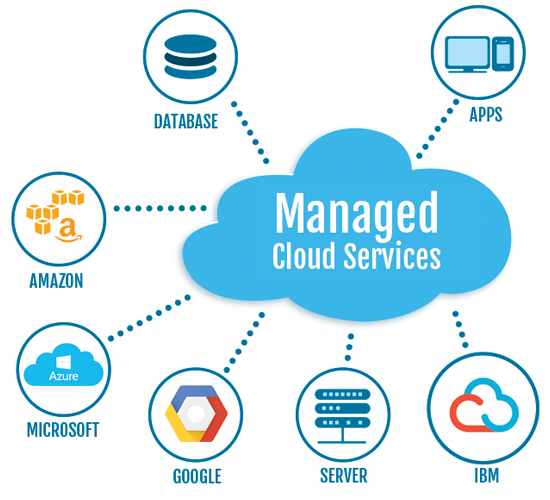Streamline IT Administration With Cloud Provider
Cloud services have emerged as a sensible remedy for companies looking to enhance effectiveness, reduce costs, and enhance total IT efficiency. Just how exactly do these cloud services revolutionize standard IT monitoring practices? Let's explore the transformative effect of leveraging cloud solutions on IT operations and the key considerations for effective execution.
Advantages of Cloud Services

In addition, cloud solutions make it possible for companies to improve their operational efficiency by simplifying procedures and reducing the time and resources required for managing IT framework. With cloud services, services can automate regular tasks, such as software program updates and data backups, freeing up IT teams to concentrate on more critical initiatives that drive company worth.

Boosted Scalability and Flexibility
Cloud solutions offer businesses with unequaled scalability and flexibility in managing their IT resources effectively. Scalability is a crucial attribute of cloud services that allows firms to conveniently change their IT resources based upon need. With cloud services, organizations can rapidly scale up or down their computer resources, storage capacity, and network data transfer to meet changing demands without the requirement for considerable upfront investments in hardware. This versatility enables organizations to adapt to changing workloads, seasonal demands, or unexpected growth without experiencing downtime or performance concerns.
Furthermore, cloud solutions supply the versatility for workers to gain access to business information and applications from anywhere, at any kind of time, and from any device with an internet link. This capacity boosts performance and cooperation amongst remote groups or workers operating in different locations. Additionally, cloud services supply the versatility to pick from a variety of solution versions, such as Facilities as a Service (IaaS), System as a Solution (PaaS), or Software Program as a Solution (SaaS), based on the specific demands of the organization. The boosted scalability and adaptability used by cloud services empower companies to optimize their IT procedures and stay nimble in today's vibrant market atmosphere.

Cost-Effectiveness and Savings
With the capacity to effectively allot sources based on demand, companies utilizing cloud solutions can harness substantial cost-effectiveness and recognize substantial savings in their IT operations. Additionally, cloud solutions lessen maintenance costs by changing the obligation of hardware maintenance and software updates to the solution company. In general, the cost-effectiveness and financial savings accomplished with cloud solutions make it possible for services to reallocate sources towards innovation and development initiatives.
Improved Security and Conformity
Enhancing the general safety and security stance and making click for more info sure regulative compliance are paramount factors to consider for businesses leveraging cloud solutions in their IT monitoring methods. Cloud company offer innovative safety and security actions, such as data security, multi-factor authentication, and automated backups, which can bolster a company's security structure. These companies additionally stick to rigorous regulatory standards, such as GDPR, HIPAA, and PCI DSS, aiding services meet compliance needs better.
Carrying out cloud services can improve protection by offering streamlined control over accessibility management, monitoring, and data defense. This centralized method streamlines protection monitoring and ensures constant application of safety plans throughout the company. Cloud services typically use real-time safety updates and spots, lowering the threat of susceptabilities and possible violations.
Ideal Practices for Cloud Execution
Applying cloud solutions efficiently calls for an organized technique that includes complete preparation and attentive implementation. To make certain a smooth change to the cloud, companies must begin by conducting an extensive assessment of their current IT framework and recognizing which work are ideal for migration. It is vital to establish clear objectives and define vital efficiency indications (KPIs) to measure the success of the cloud execution.
One of the ideal methods for cloud implementation is to meticulously choose a cloud company that aligns with the organization's requirements in regards to security, cost-effectiveness, compliance, and scalability. Furthermore, creating an in-depth movement plan that lays out the steps included, timelines, and duties is vital for an effective implementation.
Regularly checking and optimizing cloud resources to make sure reliable performance and price administration is another vital facet of cloud implementation best methods. Continual evaluation of the cloud atmosphere and remaining educated regarding updates and brand-new features provided by the cloud copyright can further improve the organization's cloud approach. By following these click to read finest techniques, companies can streamline their IT management and make best use of the advantages of cloud solutions.
Conclusion
In verdict, leveraging cloud services for IT monitoring supplies many benefits, including boosted scalability, cost-effectiveness, enhanced safety and security, and compliance. On the whole, cloud solutions boost functional performance and dexterity in managing IT infrastructure.
In addition, cloud services provide the adaptability to choose from a selection of service models, such as Framework as a Service (IaaS), System as a Solution (PaaS), or Software as a Solution (SaaS), based on the particular demands of the service. Additionally, cloud solutions reduce upkeep expenses by shifting the duty of hardware maintenance and software updates to the solution company.Enhancing the total safety posture and ensuring governing conformity are extremely important considerations for services leveraging cloud services in their IT administration strategies.Routinely monitoring and enhancing cloud sources to guarantee effective efficiency and sites cost administration is an additional vital facet of cloud implementation ideal practices. Constant analysis of the cloud environment and staying educated concerning updates and new functions used by the cloud provider can even more boost the company's cloud strategy.